24 start with T start with T

In the quarter century since the landmark Karen Ann Quinlan case, an ethical, legal, and societal consensus supporting patients' rights to refuse life-sustaining treatment has become a cornerstone of bioethics. Patients now legally can write advance directives to govern their treatment decisions at a time of future incapacity, yet in clinical practice their wishes often are ignored.
Examining the tension between incompetent patients' prior wishes and their current best interests as well as other challenges to advance directives, Robert S. Olick offers a comprehensive argument for favoring advance instructions during the dying process. He clarifies widespread confusion about the moral and legal weight of advance directives, and he prescribes changes in law, policy, and practice that would not only ensure that directives count in the care of the dying but also would define narrow instances when directives should not be followed. Olick also presents and develops an original theory of prospective autonomy that recasts and strengthens patient and family control.
While focusing largely on philosophical issues the book devotes substantial attention to legal and policy questions and includes case studies throughout. An important resource for medical ethicists, lawyers, physicians, nurses, health care professionals, and patients' rights advocates, it champions the practical, ethical, and humane duty of taking advance directives seriously where it matters most-at the bedside of dying patients.

In a timely book about contemporary life, Peter Temin describes the way in which the government has taken control over the safety and use of medicinal drugs. From the turn of the century to the present, the Food and Drug Administration increasingly has controlled the use of non-narcotic drugs both by direct regulation and by delegating the growth of federal authority to doctors. This vivid history chronicles how the growth of federal control has expanded from verifying ingredients to guaranteeing their safety and then to ensuring efficacy. The effects of the long tradition of control can be seen in the pattern of drug regulation and in the structure of the drug industry today.
More than a narrative of drug regulation, Temin’s book analyzes how doctors, lay people as consumers and patients, and government act and react in situations requiring medicines. Temin reveals that uncertainty and imperfect knowledge about the comparative effects of taking different drugs pervades such situations, and that the way people choose drugs is affected by this uncertainty. Unable to obtain feedback about the competing merits of alternative therapies in many cases, doctors and consumers rely on medical customs in making their choices. Customs are functional in the sense that they are validated by experience, but they lack the ability of instrumental behavior (in which people alter actions in response to outcomes) to adapt smoothly to changing information.
In this context, the FDA has enlarged the scope of its authority throughout the twentieth century and made increasingly detailed decisions on behalf of us all. The agency has diminished consumer control over drug use even though doctors prescribe drugs largely by customary means and consumer ignorance is in part a consequence of the agency’s own regulations. In a careful and learned book, Temin suggests how changes and revisions in laws and regulations could redress the balance of responsibility toward doctor and patient.

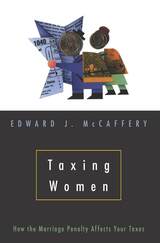
"Taxing Women is a must-have primer for any woman who wants to understand how our current tax system affects her family's economic condition. In plain English, McCaffery explains how the tax code stacks the deck against women and why it's in women's economic interest to lead the next great tax rebellion."—Patricia Schroeder
"McCaffery is an expert on the interplay between taxes and social policy. . . . Devastating in his analysis. . . . Intriguing."—Harris Collingwood, Working Women
"A wake-up call regarding the inequalities of an archaic system that actually penalizes women for working."—Publishers Weekly
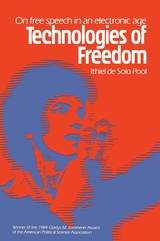



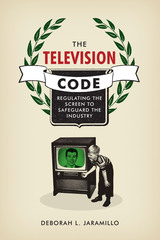
The broadcasting industry’s trade association, the National Association of Broadcasters (NAB), sought to sanitize television content via its self-regulatory document, the Television Code. The Code covered everything from the stories, images, and sounds of TV programs (no profanity, illicit sex and drinking, negative portrayals of family life and law enforcement officials, or irreverence for God and religion) to the allowable number of commercial minutes per hour of programming. It mandated that broadcasters make time for religious programming and discouraged them from charging for it. And it called for tasteful and accurate coverage of news, public events, and controversial issues.
Using archival documents from the Federal Communications Commission, NBC, the NAB, and a television reformer, Senator William Benton, this book explores the run-up to the adoption of the 1952 Television Code from the perspectives of the government, TV viewers, local broadcasters, national networks, and the industry’s trade association. Deborah L. Jaramillo analyzes the competing motives and agendas of each of these groups as she builds a convincing case that the NAB actually developed the Television Code to protect commercial television from reformers who wanted more educational programming, as well as from advocates of subscription television, an alternative distribution model to the commercial system. By agreeing to self-censor content that viewers, local stations, and politicians found objectionable, Jaramillo concludes, the NAB helped to ensure that commercial broadcast television would remain the dominant model for decades to come.

Based on extensive fieldwork and oral history, The Terms of Our Surrender is a powerful critical appraisal of unceded indigenous land ownership in eastern Canada. Set against an ethnographic, historical, and legal framework, this book traces the myriad ways the Canadian state has evaded the 1763 Royal Proclamation that guaranteed First Nations people a right to their land and way of life.
Focusing on the Innu of Quebec and Labrador, whose land has been taken for resource extraction and development, this book strips back the law of fiduciary duty to its origins. The Terms of Our Surrender argues for the preservation of land ownership and positions First Nations people as natural land defenders amidst a devastating climate crisis. This volume offers a voice to the Innu people, detailing the spirituality practices, culture, and values that make it impossible for them to willingly cede their land.
This book is intended to bridge the gap in knowledge between legal practitioners and those working at the intersections of human rights, social work, and public policy. It offers a potent template for using the law to fight back against the indignities suffered by indigenous communities.
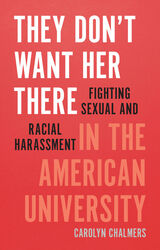
As Jew gained accolades and advanced through the ranks at Iowa, she was met with increasingly vicious attacks on her character by her white male colleagues—implying that her sexuality had opened doors for her. After years of being subjected to demoralizing sexual, racial, and ethnic discrimination, finding herself without any higher-up departmental support, and noting her professional progression beginning to suffer by the hands of hate, Jean Jew decided to fight back. Carolyn Chalmers was her lawyer.
This book tells the inside story of pioneering litigation unfolding during the eight years of a university investigation, a watershed federal trial, and a state court jury trial. In the face of a university determined to defeat them and maintain the status quo, Jew and Chalmers forged an exceptional relationship between a lawyer and a client, each at the top of their game and part of the first generation of women in their fields. They Don’t Want Her There is a brilliant, original work of legal history that is deeply personal and shows today’s professional women just how recently some of our rights have been won—and at what cost.
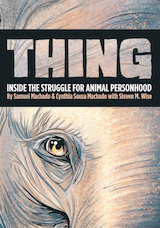
Led by lawyer Steven M. Wise and aided by some of the world’s most respected animal behavior and cognition scientists, the Nonhuman Rights Project has filed cases on behalf of nonhuman animals like Happy since 2013. Through this work, they have forced courts to consider the evidence of their clients’ cognitive abilities and their legal arguments for personhood, opening the door for similar cases worldwide. In Thing, comic artists Sam Machado and Cynthia Sousa Machado bring together Wise’s groundbreaking work and their powerful illustrations in the first graphic nonfiction book about the animal personhood movement. Beginning with Happy’s story and the central ideas behind animal rights, Thing then turns to the scientists that are revolutionizing our understanding of the minds of nonhuman animals such as great apes, elephants, dolphins, and whales. As we learn more about these creatures’ inner lives and autonomy, the need for the greater protections provided by legal rights becomes ever more urgent.
With cases like Happy’s growing in number and spanning from Argentina to India, nations around the world are beginning to recognize the rights of animals. Combining legal and social history, innovative science, and illustrated storytelling, Thing presents a visionary new way of relating to the nonhuman world.


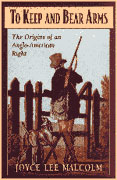
Joyce Malcolm illuminates the historical facts underlying the current passionate debate about gun-related violence, the Brady Bill, and the NRA, revealing the original meaning and intentions behind the individual right to “bear arms.” Few on either side of the Atlantic realize that this extraordinary, controversial, and least understood liberty was a direct legacy of English law. This book explains how the Englishmen’s hazardous duty evolved into a right, and how it was transferred to America and transformed into the Second Amendment.
Malcolm’s story begins in turbulent seventeenth-century England. She shows why English subjects, led by the governing classes, decided that such a dangerous public freedom as bearing arms was necessary. Entangled in the narrative are shifting notions of the connections between individual ownership of weapons and limited government, private weapons and social status, the citizen army and the professional army, and obedience and resistance, as well as ideas about civilian control of the sword and self-defense. The results add to our knowledge of English life, politics, and constitutional development, and present a historical analysis of a controversial Anglo-American legacy, a legacy that resonates loudly in America today.
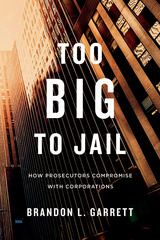
American courts routinely hand down harsh sentences to individual convicts, but a very different standard of justice applies to corporations. Too Big to Jail takes readers into a complex, compromised world of backroom deals, for an unprecedented look at what happens when criminal charges are brought against a major company in the United States.
Federal prosecutors benefit from expansive statutes that allow an entire firm to be held liable for a crime by a single employee. But when prosecutors target the Goliaths of the corporate world, they find themselves at a huge disadvantage. The government that bailed out corporations considered too economically important to fail also negotiates settlements permitting giant firms to avoid the consequences of criminal convictions. Presenting detailed data from more than a decade of federal cases, Brandon Garrett reveals a pattern of negotiation and settlement in which prosecutors demand admissions of wrongdoing, impose penalties, and require structural reforms. However, those reforms are usually vaguely defined. Many companies pay no criminal fine, and even the biggest blockbuster payments are often greatly reduced. While companies must cooperate in the investigations, high-level employees tend to get off scot-free.
The practical reality is that when prosecutors face Hydra-headed corporate defendants prepared to spend hundreds of millions on lawyers, such agreements may be the only way to get any result at all. Too Big to Jail describes concrete ways to improve corporate law enforcement by insisting on more stringent prosecution agreements, ongoing judicial review, and greater transparency.

Why do we know every gory crime scene detail about such victims as Matthew Shepard and James Byrd Jr. and yet almost nothing about the vast majority of other hate crime victims? Now that federal anti-hate-crimes laws have been passed, why has the number of these crimes not declined significantly? To answer such questions, Clara S. Lewis challenges us to reconsider our understanding of hate crimes. In doing so, she raises startling issues about the trajectory of civil and minority rights.
Tough on Hate is the first book to examine the cultural politics of hate crimes both within and beyond the law. Drawing on a wide range of sources—including personal interviews, unarchived documents, television news broadcasts, legislative debates, and presidential speeches—the book calls attention to a disturbing irony: the sympathetic attention paid to certain shocking hate crime murders further legitimizes an already pervasive unwillingness to act on the urgent civil rights issues of our time. Worse still, it reveals the widespread acceptance of ideas about difference, tolerance, and crime that work against future progress on behalf of historically marginalized communities.

Toward a National Power Policy offers a comprehensive analysis of the conflict between Franklin D. Roosevelt's New Deal and the electric utility industry. Philip J. Funigiello outlines the origins and evolution of the privately owned industry, and the growth of an anti-monopoly movement in the 1920s. He details the four major areas of conflict between public and private interests: the Holding Company Act, the Rural Electrification Administration, the Bonneville Power Administration, and power planning for the second World War. Funigiello reveals the complexities of top-level policymaking and the networks of interpersonal relationships that led to both conflict and compromise, and concludes that the failure of the Roosevelt administration to develop a well-defined philosophy prevented the development of a national power policy.
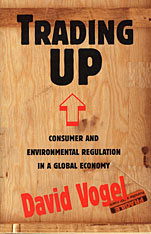
Health, safety, and environmental regulations have been traditionally perceived as distinct entities from trade policy, yet today they have become intertwined on a global scale. In this pioneering work, David Vogel integrates environmental, consumer, and trade policy, and explicitly challenges the conventional wisdom that trade liberalization and agreements to promote free trade invariably undermine national health, safety, and environmental standards. Vogel demonstrates that liberal trade policies often produce precisely the opposite effect: that of strengthening regulatory standards.
The most comprehensive account of trade and regulation on a global scale, this book analyzes the regulatory dimensions of all major international and regional trade agreements and treaties, including GATT, NAFTA, the Free Trade Agreement between Canada and the United States, and the treaties that created the European Community and Union. He explores in depth some of the most important trade and regulatory conflicts, including the GATT tuna-dolphin dispute, the EC's beef hormone ban, the Danish bottle case, and the debate in the United States over the regulatory implications of both NAFTA and GATT.
This timely book unravels the increasingly important and contentious relationship between trade and environmental, health, and safety standards, paying particular attention to the politics that underlie trade and regulatory linkages. Trading Up is essential reading for the business community, policymakers, environmentalists, consumer interest groups, political scientists, lawyers, and economists.

Women and children have been bartered, pawned, bought, and sold within and beyond Africa for longer than records have existed. This important collection examines the ways trafficking in women and children has changed from the aftermath of the “end of slavery” in Africa from the late nineteenth century to the present.
The formal abolition of the slave trade and slavery did not end the demand for servile women and children. Contemporary forms of human trafficking are deeply interwoven with their historical precursors, and scholars and activists need to be informed about the long history of trafficking in order to better assess and confront its contemporary forms. This book brings together the perspectives of leading scholars, activists, and other experts, creating a conversation that is essential for understanding the complexity of human trafficking in Africa.
Human trafficking is rapidly emerging as a core human rights issue for the twenty-first century. Trafficking in Slavery’s Wake is excellent reading for the researching, combating, and prosecuting of trafficking in women and children.
Contributors: Margaret Akullo, Jean Allain, Kevin Bales, Liza Stuart Buchbinder, Bernard K. Freamon, Susan Kreston, Benjamin N. Lawrance, Elisabeth McMahon, Carina Ray, Richard L. Roberts, Marie Rodet, Jody Sarich, and Jelmer Vos.


Once upon a time, virtually no one in the academy thought to sue over campus disputes, and, if they dared, judges bounced the case on grounds that it was no business of the courts. Tenure decisions, grading curves, course content, and committee assignments were the stuff of faculty meetings, not lawsuits.
Not so today. As Amy Gajda shows in this witty yet troubling book, litigation is now common on campus, and perhaps even more commonly feared. Professors sue each other for defamation based on assertions in research articles or tenure review letters; students sue professors for breach of contract when an F prevents them from graduating; professors threaten to sue students for unfairly criticizing their teaching.
Gajda’s lively account introduces the new duo driving the changes: the litigious academic who sees academic prerogative as a matter of legal entitlement and the skeptical judge who is increasingly willing to set aside decades of academic deference to pronounce campus rights and responsibilities.
This turn to the courts is changing campus life, eroding traditional notions of academic autonomy and confidentiality, and encouraging courts to micromanage course content, admissions standards, exam policies, graduation requirements, and peer review.
This book explores the origins and causes of the litigation trend, its implications for academic freedom, and what lawyers, judges, and academics themselves can do to limit the potential damage.

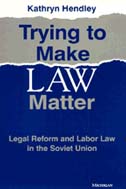
Trying to Make Law Matter provides unique insight into the possibility of creating the rule of law. It is based on Kathryn Hendley's pathbreaking field research into the actual practices of Russian trial courts, lawyers, factory managers, and labor unions, contrasting the idealistic legal pronouncements of workers' rights during the Gorbachev era with tawdry reality of inadequate courts and dispirited workers.
Hendley frames her study of Russian law in action with a lively theoretical analysis of the fundamental prerequisites of the rule of law not only as a set of ideals but as a legal system that rests on the participation of rights-bearing citizens. This work will appeal to law, political science, and sociology scholars as well as area specialists and those who study transitions to market democracy.
Kathryn Hendley is Professor, Law and Political Science, University of Wisconsin, Madison.
READERS
Browse our collection.
PUBLISHERS
See BiblioVault's publisher services.
STUDENT SERVICES
Files for college accessibility offices.
UChicago Accessibility Resources
home | accessibility | search | about | contact us
BiblioVault ® 2001 - 2024
The University of Chicago Press









